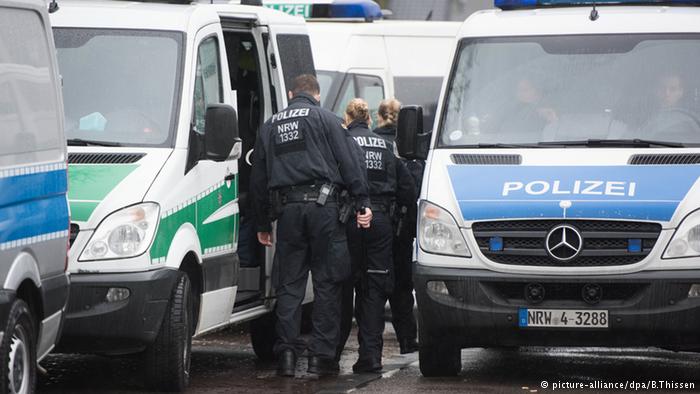A Syrian man suspected of plotting an Isis bomb attack was arrested on Monday by German police with the help of three of his compatriots, in a case that sparked fresh calls for greater checks on asylum seekers.
Jaber Albakr, 22, had narrowly slipped through the police net on Saturday when commandos raided his apartment in Chemnitz and found 1.5 kilos of TATP, the homemade explosive used by jihadists in the Paris and Brussels attacks last year.
The explosives were “almost ready, or even ready for usage”, said Jörg Michaelis, chief investigator in the eastern state of Saxony, adding that the suspect was apparently preparing a “bomb, possibly in the form of a suicide vest”.
After a manhunt over the weekend, police finally got their man with the help of three of Albakr’s fellow Syrians, who had detained him in their apartment in the eastern city of Leipzig.
“A witness came to the police station and said he had recognized Albakr… and had a photo of Albakr on his mobile phone,” said Michaelis.
“He also said that his flatmates have overpowered Albakr and tied him up, and that we should come to his apartment.”
Police declined to give further details on the Syrian informants for fear of reprisals against them.
German media reported that the fugitive had approached two Syrians at the main train station in Leipzig, seeking shelter.
The men had invited Albakr to their apartment, but later realized that their guest was being sought when police broadcast an appeal for help in Arabic, the Bild newspaper said.
When police finally stormed the apartment, the officers found one of the Syrians kneeling on Albakr to hold him down, said Bild.
Chancellor Angela Merkel expressed thanks to the man who tipped off police.
“Our thanks and our recognition go out to the man from Syria who informed the police about the suspect’s whereabouts,” Merkel’s spokesperson, Ulrike Demmer, said.
Demmer said that the man had made a crucial contribution to the capture of the suspect, and added that the Chancellor wanted to also express her gratitude to police “for the heavy responsibility they carry,” the Süddeutsche Zeitung reports.
Investigators said on Monday afternoon that Albakr appears to have had contact with Isis.
“The approach and behaviour of the suspect point to an Isis contact,” said Jörg Michaelis, chief investigator in the eastern state of Saxony.
“We’re spent but overjoyed: the terror suspect Albakr was arrested overnight in Leipzig,” police said on Twitter on Monday.
‘Bomb-making lab’
Acting on information from the domestic secret services, investigators had sought to swoop on Albakr on Saturday in the eastern town of Chemnitz, about 85 kilometres (50 miles) south of Leipzig.
But he narrowly evaded police and ran off carrying a backpack, local media said.
Interior Minister Thomas de Maizière said the plot “resembles what we know of the preparations for the attacks in Paris and Brussels”.
Albakr’s Syrian flatmate in Chemnitz, named only as Khalil A., was formally taken into custody Sunday, a day after being detained, as a suspected co-conspirator.
The 33-year-old accomplice is accused of allowing Albakr “to use his apartment and for helping to order the necessary material on the internet in full knowledge of his plans of attack,” according to a statement from the federal prosecutors.
Police on Sunday also raided the Chemnitz home of another suspected contact of Albakr and took away a man for questioning.
Albakr had entered Germany on February 18th 2015 and two weeks later filed a request for asylum, which was granted in June that year.
Khalil A. had filed for asylum in December 2015 and was granted refugee status in March this year.
Germany on edge
Germany has been on edge since two Isis-claimed attacks in July – an axe rampage on a train in Wuerzburg that injured five, and a suicide bombing in Ansbach in which 15 people were hurt.
The bloodshed has fuelled concerns over Germany’s record influx of nearly 900,000 refugees and migrants in 2015, heightened by a number of foiled attack plots this year.
Last month police detained three men with forged Syrian passports who were believed to be a possible Isis “sleeper cell” with links to those behind the November Paris attacks.
They also arrested a 16-year-old Syrian refugee in Cologne on suspicion he was planning a bomb attack in the name of Isis.
German authorities have urged the public not to equate refugees with “terrorists” but have acknowledged that more jihadists may have entered the country among the asylum seekers who arrived last year.
Chancellor Merkel’s conservative CDU party on Monday called for greater rights for security services to carry out checks on asylum seekers.
“We see that the German secret service and federal intelligence service have no access currently to the main files of applicants,” said the deputy leader of the CDU’s parliamentary group, Michael Kretschmer.
“That needs to change, we want the German secret services to have access to these files,” he told local broadcaster MDR.




















